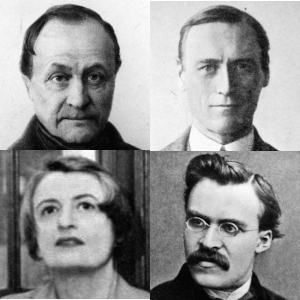- Altruism is truly selfless, and it’s good.
- Altruism is truly selfless, and it’s bad.
- Altruism is enlightened self-interest, which is good.
- Altruism is disguised/corrupted/decadent self-interest, which is bad.

To illustrate further, though at the risk of oversimplifying…
One exponent of option #1 would be Auguste Comte who thought that living for others was the foundation of true morality and of the best society.[1]
An exponent of option #2 would be Ayn Rand, who thought that altruism was indeed a doctrine of selflessness, but that this was the antithesis of true morality, and a threat to people.[2]
An exponent of option #3 would be Pierre Cérésole, who felt that altruism is what results when you refine your self-interest successfully and rid it of its mistakes.[3]
An exponent of option #4 would be Nietzsche, who thought altruism was a corrupted and decadent form of selfishness, and that we would be better off if we could be more forthrightly self-interested.[4]
Knowing LessWrong, probably everyone who answers is going to choose some nuanced and galaxy-brained option #5 instead, but I thought I’d ask anyway.
- ^
Auguste Comte “General Theory of Religion” The Catechism of Positive Religion (also e.g. “Social Physics”)
- ^
Ayn Rand, The Virtue of Selfishness (also e.g. “Galt’s Speech” For the New Intellectual; “Faith and Force: The Destroyers of the Modern World” Philosophy: Who Needs It)
FWIW, in "Justice, Cherryl." @Zack_M_Davis suggests that Rand is really closer to the position I attribute to Nietzsche.
- ^
Pierre Cérésole For Peace and Truth
- ^
Friedrich Nietzsche Beyond Good and Evil, The Twilight of the Idols, etc.
Sometimes altruism is truly selfless (if we don't use too broad tautological definition of self-interest).
Sometimes altruism is actually an enlightened/disguised/corrupted/decadent self-interest.
I feel like there is some sense in which first kind is better then second, but can we have more of whatever kind, please?